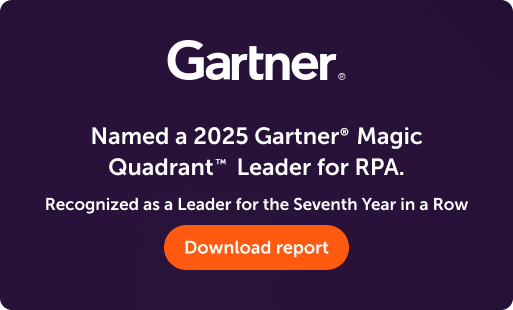- Login
- Search
- Contact Us
-
Have a question? Our team is here to help guide you on your automation journey.
-
Explore support plans designed to match your business requirements.
-
How can we help you?
-
- AI
AI Without the Hype From pilot to full deployment, our experts partner with you to ensure real, repeatable results. Get Started
- Automation Anywhere AI
-
- Solutions
Featured Agentic Solutions
Accounts Payable Invoice automation—No setup. No code. Just results. Accounts Payable
Customer Onboarding Scale KYC/AML workflows. Customer Onboarding
Customer Support Keep queues moving, even at peak load. Customer Support
Healthcare RCM Revenue cycle management that runs itself. Healthcare RCM
- Products
Platform Features
- Agentic process automation (APA)
- Robotic Process Automation (RPA)
- View all Products
-
- Resources
Get Community Edition: Start automating instantly with FREE access to full-featured automation with Cloud Community Edition.
Featured
 Named a 2025 Gartner® Magic Quadrant™ Leader for RPA.Recognized as a Leader for the Seventh Year in a Row Download report Download report
Named a 2025 Gartner® Magic Quadrant™ Leader for RPA.Recognized as a Leader for the Seventh Year in a Row Download report Download report- Become an Expert
- Developer Tools
- Get Support
- View all resources
-
- Partners
Find an Automation Anywhere Partner Explore our global network of trusted partners to support your Automation journey Find a Partner Find a Partner
- Find a Partner
- For Partners
-
Blog
Modernizing Corporate Compliance Programs with Data Analytics Tools
Share this:
This article was originally printed on the FortressIQ website and includes updates to reflect the company’s change in status. FortressIQ is now part of Automation Anywhere, and its offering is now our process intelligence product.
Incorporating data-driven capabilities into corporate compliance programs speeds response, extends coverage, and eliminates bias. But despite the value added by operational data, the pace of adoption has been glacial. That may be changing, however, courtesy of an unexpected stakeholder: the government. The result is that, as companies are scrambling to meet these new compliance expectations, they are finding surprising benefits.
Nudging compliance to be data-driven
This past summer, the U.S. Department of Justice instructed its prosecutors to ask companies under investigation whether their compliance teams have access to data. If so, they’re further asked if it is being used to test policies and monitor for risks. The authorities have even shown a willingness to cut penalties for companies that have implemented data analytics or monitoring tools into their compliance programs. This bias towards leniency is a major incentive for compliance officers to explore solutions that can provide access to financial and operational data.
While other parts of the businesses, most notably sales and finance, have long used data to drive decision-making, the adoption of analytics tools in compliance has been slow. Budgets are often a constraint, but there is also the cultural issue of not wanting to uncover unknown issues.
Companies should be embracing the shift, however, and not only because data-driven companies tend to outperform their peers. According to Forrester Consulting, businesses that rely on data management tools to make decisions are 58% more likely to beat their revenue goals than non-data-driven companies, and they see an 8% boost in customer trust. The benefits are clear and compelling.
Compliance-centric analytics tools
One challenge for compliance officers in adopting data analytics tools is the lack of purpose-built solutions to support robust compliance programs. Some companies have begun the journey by simply hiring data scientists to support ad hoc exploration, or by tapping into a nascent market of third-party vendors with limited capabilities. A bespoke data analytics application may be appropriate, but it is a timely and costly proposition most companies are unwilling to tackle, instead preferring to delay implementation until solutions mature.
With the Automation Anywhere process intelligence solution, compliance officers can capture all the work happening right now and review it for insights when time or resources permit. They can also integrate insights into existing business intelligence platforms for broader and deeper analysis.
Automating compliance in our current reality
Today’s unprecedented business environment has forced organizations to adopt new distributed and remote work patterns at a breakneck pace, but that comes at the expense of existing compliance activities. Every organization has had to rewrite its playbook to deliver value in a new, uncertain world of broken supply chains, changing customer expectations, and evolving communication patterns. In addition, traditional compliance and process discovery methods in the form of on-site consultants or business analysts, which have typically been used to address strategic challenges, are currently not an option. That is especially true for those with a global, remote workforce.
Through trial-by-fire tactics, companies are triaging and re-engineering processes just to address the basic needs of their employees and customers. Countless hours, combined with trial and error, have enabled distributed teams to build tribal knowledge on new and innovative ways of delivery. But the need to overcome pandemic-induced obstacles has forced many companies to pause traditional compliance programs. That is unsustainable.
Anticipating that variations of today’s disrupted business environment will likely occur again, it is imperative that this business knowledge be converted into institutional comprehension. Compliance initiatives are an ideal starting point. And process intelligence can help smooth the path.
Modernize with Automation Anywhere.
About Rahul Talwar
Formerly with FortressIQ, Rahul is a director of product management at Automation Anywhere.
Subscribe via Email View All Posts LinkedInGet to know the Agentic Process Automation System.

For Students & Developers
Start automating instantly with FREE access to full-featured automation with Cloud Community Edition.



